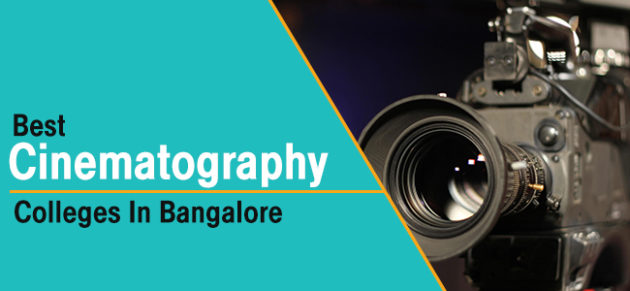Best BA in Film Making or Cinematography Colleges in Bangalore – Course Details, Eligibility, Syllabus based on 2022 – 23 Rankings and Reviews
Updated on 17 March 2023

BA in Film making or Cinematography in Bangalore
Movies invoke an extremely satisfying trip. Many of us, I assume, spend some time watching a movie to unwind at the end of a hectic day. We may even drop by at the nearest movie theatre to catch one of the latest flicks.
For those couple of hours, the artistic expression of the performers and the overall narrative of the film ship us to a whole new different world. We forget all the trials and tribulations of life and get lost in a fictional universe. Now, this would only happen, of course, if the movie is good, or else your stress levels are bound to increase if the movie you’re watching ends up being incredibly bad. So what makes for an exceptional movie?
It’s the perfect combination of everything – an engaging story, a talented cast, a visionary director and the focus of this article – a competent cinematography team.
The cinematography is termed as the art and science of camerawork, moving images and photography in filmmaking.
Movies such as There Will Be Blood, Inception, Birdman, The Revenant, and Blade Runner 2049, just to name a few, are enjoyable to watch majorly because of it’s beautiful cinematography. The cinematography is all about using the right shots, angles, colors, themes and tools to convey the perfect mood or emotion of a scene and to consistently do that all throughout the movie.
Cinematography is one of the most important aspects in the process of filmmaking and requires thorough study and training. That’s where BA in Cinematography comes into the picture…
What is BA in Cinematography?
Bachelor of Arts (BA) in Cinematography is a 3-year undergraduate course that is a comprehensive study of motion-picture photography.
The course first lays the foundation. This includes taking a theoretical look at the history and fundamentals of Photography, cinema, art, and design. The programme, as you may have foreseen, is quite practical in nature.
Once the basics are strong, the coursework moves on to the elements of photography, the equipment required, the principles of lighting, still life, portraiture, and people.
The first year is all about setting the groundwork. The subsequent years focus on the advanced and intricate parts of Cinematography such as camera placement, lens, camera movement, color grading, creative lighting, post-production techniques, story creation and structure, editing, scenes, knowing the structure of the movie-making team, etc.
As a career, Cinematography calls for high levels of creativity and focus with very little room for errors. The course is designed to create candidates who are more hands-on with their approach, who can pick up existing principles of cinematography and use them in the most inventive way possible.
BA in Cinematography Course Duration and Structure:
BA in Cinematography is a 3-year undergraduate course that is split into 6 semesters. The candidate is given two extra years to clear all backlog subjects and complete the course.
Some institutes even offer 1-2 year diploma courses in Cinematography, however, nothing beats a proper bachelor’s degree.
BA in Cinematography Eligibility Criteria:
- Candidates must have passed 10+2 from a recognized board and can be from any stream – Science, Arts or Commerce.
- The minimum cut-off ranges between 55% to 60%. It’s always safe to aim at scoring high in 10+2 exams to increase your chances of getting into a reputed institute.
- Some institutes would need you to clear an entrance exam as well as group and personal interview rounds.
BA in Cinematography Admission Process:
- The first thing you need to do is the note down your requirements. These should be with respect to particulars such as fees, location, career scope, campus life, and amenities.
- Visit the website of the college you wish to join and download the admission forms. Some colleges would need you to visit the campus and collect the forms in person.
- Get all the required documents and submit them along with the form.
- Clear the entrance exam, if any, and wait for the merit list to be released by the college.
- If you name features on the merit list, you would need to pay a certain part of fees at the time of the admission.
- Paying the sum would confirm your seat.
Too much work? Give us a call at 08061160468 and we’ll handle the rest.
BA in Cinematography Syllabus and Course Structure:
The subjects are distributed across the six semesters as part of the 3-year programme. Given below is a semester-wise breakdown of the subjects as prescribed by Bharathiya Vidyapeeth:
| Semester I |
| Art and Design (Foundation)
English Photography Fundamentals Equipment and Processes History of Art History of Photography |
| Semester II |
| History of Cinema
People and Portraiture English Still Life and Products Elements and Principles of Design in Photography Basic Post-Production |
| Semester III |
| Lens (Types, Speed, Field of Vision, Distortion, Perspective, Shutter Speed, Depth, Sharpness, etc.)
Technical Introduction to the Camera (Exposure, Modern Cameras, Sensors, Image Creation, Shutter Speed, Aperture, tec.) Camera Movement (Movement Types, Static Shots, Significant Camera Movements) Camera Placement (Shot Types, Shot Sizes, Camera Distance, Different Viewpoints, Different Heights, Different Angles) |
| Semester IV |
| Colour (Relativity of Colour, Human Eye, Colour Interpretation, Emotion and Colour, Colour in Images and Film)
Lighting Tools (Properties of Light, Professional Lighting Tools, Improvised Lighting, Angle, Diffusion, Shape, Texture, Mood and Depth, safety) Creative Lighting (Three-Point Lighting, Lighting Analysis, Lighting the Face, Visual Intensity, Contrast, Evaluating Color Contrast, Practical Lighting Applications) Post Production (Color Grading, Basic Editing) |
| Semester V |
| Long Take (Fictional Time, Pace, Rhythm, Real Time, Camera Movement, Cuts, Lighting)
Story (Script Breakdown, Three-act Structure, Music Video, Screenplay, Visual Guidelines, Visual References, Shot List) Post Production (Color Grading, Advanced Editing) Continuity (Editing, Structure, Analysis, Types of Continuity, Continuity of Space, Time, Content, Lighting) |
| Semester VI |
Collaboration
|
The teaching methods of the course include theory lectures, practicals, workshops and seminars conducted by experienced professionals from the industry.
Assessment is done via semester-end written examinations and projects. As it’s a project-heavy course, students are advised to put in extra effort into their project work.
BA in Cinematography Average Fees:
The average course fee for the entire course ranges between Rs. 3.6 – 5 lakhs. The fee in popular colleges can spike up to Rs. 12 lakhs for the 3-year programme.
BA in Cinematography Job Opportunities and Future Scope:
In case you haven’t noticed, yet, the increase in audio-video content Is a rising trend across all mediums. It’s not just movies and TV anymore that need professionals who know Cinematography well as the Streaming Era has multiplied the sheer amount of content we consume.
Netflix Specials, Prime Originals, and other unique offerings from streaming service companies require large teams of cinematographers to put out a finished product.
Coming to traditional areas such as movies, India is the undisputed king in terms of demand and supply. With many industries scattered throughout the country that produces a total of almost 2000 movies a year including Bollywood, you shouldn’t find it hard to find jobs, that is if you are good at your job.
Big-time and small-time production houses are constantly hiring Cinematographers, but that’s just the tip of the iceberg. Television has always been a billion-dollar industry and despite the advent of streaming and internet, continues to have a strong viewership who need to be fed with new types of content.
YouTube, Facebook, Twitter, Instagram, Dailymotion, Vimeo, and many other similar websites serve as platforms for various content producers – both independent as well as major companies. One of the biggest reasons why T-Series will overtake PewDiePie as the most subscribed channel of YouTube is because of the volume of content they upload. Such a high volume can only be sustained if there is a massive team, which always has Cinematographers.
Movies, TV shows, documentaries, music videos, short films, ad films – you name it and cinematographers are needed.
To give you a better idea of what you may be getting into, here are the employment areas and job roles you can take up after completing a BA in Cinematography.
Job Areas:
- Production Houses
- Media and Entertainment Companies
- Film Production Companies
- Television Production Companies
- Music Video Production Firms
- Ad Film Companies
- Advertising Firms
- Wildlife Photography
- Theatre
- 3-D and Animation Filmmaking
- Streaming Service Companies
- Marketing firms
- Photography Firms
- Broadcasting Corporations
- Entertainment, Culture and Sports Websites
Job Roles:
- Director
- Cameraman
- Director of Photography
- Camera Operator
- Lighting Expert
- Producer
- Film Editor
- Art Director
- Camera Operator
- Content Developer/ Producer
- Script Supervisor
- Steadicam Operator
- Data Wrangler
- Camera Trainee
- Digital Imaging Technician
- Focus Puller
- Clapper Loader
- Specialist Camera Operator
The initial phase may be a struggle for camera operators as the job can be demanding and oddly timed. Additionally, shoots may happen at obscure locations which would involve a lot of traveling. Also, the pay wouldn’t be that great either for entry-level trainees in the field of Cinematography.
BA in Cinematography Average Salary and Payscale:
A fresher who has completed his or her BA in Cinematography can earn between Rs. 1.2 – 2.4 lakhs per year.
The figure can go up to Rs. 7-10 lakhs per year as experience is gathered. The cinematography is one of those areas where you can earn a lot if you manage to land big projects. There are tons of projects of varying sizes out there, thus making money shouldn’t be a problem. However, you need to be good at your job and should focus on building up a good resume and reputation in the industry.
There is no maximum cap when it comes to salaries in Cinematography. The sky is the limit when it comes to money.
Higher Studies after BA in Cinematography:
There are a handful of institutes offering the following post-graduation programmes in Cinematography:
- Post-Graduation Diploma in Cinematography (1/3 years)
- Post-Graduation Diploma in Television and Film Production (1 year)
- Post-Graduation Diploma in Film, Television and Digital Video Production
- Master of Science (M.Sc.) in Filmmaking
BA in Film Making or Cinematography Colleges in Bangalore:
-
St. Benedict’s Academy
Address: Asirvanam, Anchepalya, Kumbalgodu Post, Bangalore – 560074
- Presidency University Bangalore
- CMR University Bangalore



